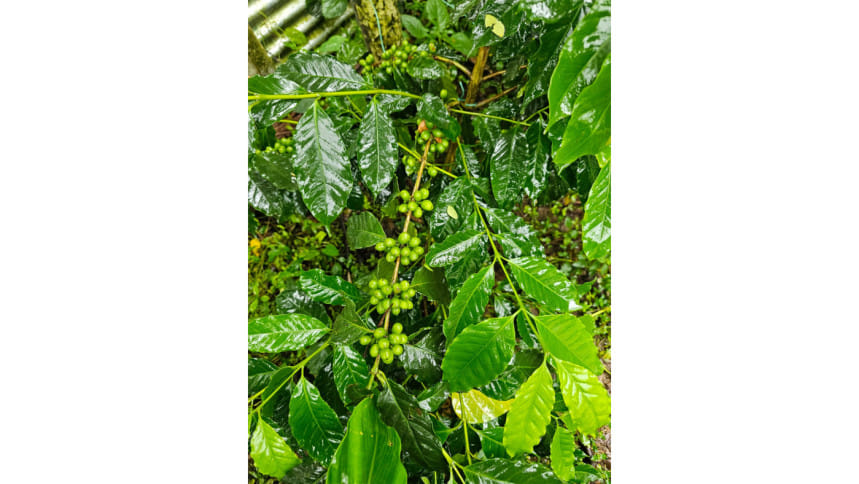Coffee cultivation gains ground in Sherpur hills

Farmers in the hilly areas of Sherpur are increasingly turning to coffee cultivation, drawn by its low cost, ease of maintenance, and profitability.
According to officials from the Department of Agricultural Extension (DAE) in Sherpur, coffee can be cultivated in areas that mostly remain uncultivable throughout the year or in orchards as a mixed crop.
Md Abdul Wadud, upazila agriculture officer in Nalitabari, said, "Initially, coffee was cultivated in some 12 villages of Ramchandrakura, Poragoan, Kakorkandi, and Rupnarayankura unions in Nalitabari in 2021. But later, more farmers, mostly small and marginal, started showing interest."
Farmers are now selling each coffee sapling at Tk 20, generating additional income and making it easier for them to maintain their plants.
The coffee plants begin to bear fruit at the age of three, with production increasing each year. Farmers can continue harvesting from the same plant for up to 30 years, the official added. The DAE is also providing training to help farmers improve their cultivation practices.
A farmer can harvest around seven kilogrammes of coffee seeds from a five-year-old plant. Currently, each kilogramme is being sold at Tk 150 in the local market.
Khandakar Jalal Uddin, a farmer from Beltoil village in Nalitabari, said he cultivated coffee on 30 decimals of land and made a profit of Tk 20,000 this season, excluding all costs.
Monir Hossain from Baruajani village said he made a net profit of Tk 22,000 from 35 decimals of land. Both farmers said this was their first harvest and that production is expected to increase as the plants mature.
DAE officials said saplings are being distributed for free to expand cultivation. Coffee farming has now spread to around 20 villages in Nalitabari and Jhenaigati upazilas in Sherpur, as well as Haluaghat upazila in Mymensingh.
A farmer can plant around 700 saplings on one acre of land, potentially producing up to 5,000kg of seeds annually and earning over Tk 7 lakh. Such income is highly beneficial for hilly farmers, who often lack farming opportunities during the off-season, the officials added.
Contacted, Mohammad Shakhauat Hossain, deputy director of the DAE in Sherpur, said the overall weather conditions in the hilly areas are highly suitable for coffee cultivation.
"The cultivation first started in Nalitabari a few years ago and is now spreading to adjacent areas. It is very promising as a new crop," he said, adding that the DAE is supporting farmers to help ensure better yields.

 For all latest news, follow The Daily Star's Google News channel.
For all latest news, follow The Daily Star's Google News channel. 



Comments